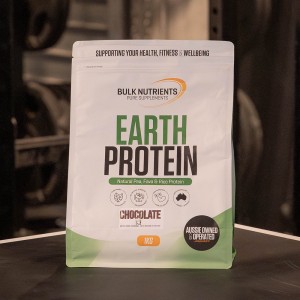IIFYM Explained: How Flexible Dieting Leads to Long Term Fat Loss

IIFYM for fat loss: How to get it right
Flexible dieting and IIFYM are the same dietary approach, balancing whole foods (spinach, rice, fish) with processed foods (lollies, donuts, etc) for balance and dietary adherence.
IIFYM stands for "If It Fits Your Macros," with "macros" short for Macronutrients: protein, fat and carbohydrates. So, what does this have to do with weight loss? Let's take the example of Bulk Nutrients customer Jason, who, as part of his fat loss diet, needs to eat the following macronutrients daily to be in a 20% calorie deficit to the tune of 2200 calories:
Protein: 220 grams (x 4 = 880 calories)
Fat: 80 grams (x 9 = 720 calories)
Carbohydrates: 150 grams (x 4 = 600 calories)
Total = 2200 calories.
(Please note that Jason's daily macronutrient numbers are hypothetical and are not a one-size-fits-all solution).
An example of IIFYM in action for weight loss
Let's say Jason on his IIFYM diet eats 100 grams of his allocated carbohydrates from white or sweet potatoes. That would leave him with 50 grams of carbohydrates left to eat for the day. Jason, having had a big week in the gym and being strict with his diet choices, decides he's going to get his remaining 50 grams of carbohydrates from ice cream. An IIFYM diet allows for this, declaring that Jason can consume the ice cream "If It Fits Your Macros." Now because it DOES fit Jason's macros, he can eat it and still lose weight.
When this dietary approach first rose to prominence, many people scoffed at its "unhealthy" nature: "How can anyone eat sugar for their carbohydrate intake and think that is healthy or acceptable?" It flew in the face of all the: "let's eat 'clean' 24/7, chicken breast, broccoli, and green smoothies for life!" advice we'd been told for years.
But this approach ignored one crucial thing; we cannot sustain such a rigid diet for long-term periods. Moreover, when the social media cameras weren't rolling, we were indulging in "fast foods" and "forbidden" foods like Pizza and hamburgers, which led to some of us developing a bad relationship with food.

Are IIFYM and Flexible dieting healthy and good for fat loss?
Others thought flexible dieting was only eating carbohydrates and fats from sources like ice cream, pizza and other fast food. There were even terrible studies done like this one, that actually compared this fast-food approach to flexible dieting (which flexible dieting isn't, at all!) to a diet full of whole foods. The study a diet full of whole foods was better for weight loss when calories were matched. It would have been a terrific study, if only it was matched to the "real world" approach!
Of course, flexible dieting is "flexible." Let us compare it to a work/life balance: it's not all work and no play, and not all play and no work; it's a balance.
In reality, flexible dieting and IIFYM is eating 20% of your daily calories from processed foods and 80% from whole foods. This 80/20 recommendation is due to the findings of scientists, who found that 20% of total calories in the form of sugar is approximately the limit that won't adversely water down a diet’s concentration of essential micronutrients.

What science says about flexible dieting and IIFYM
When studies that were set up properly (one group only eating whole foods and others allowed to have a small portion of "junk" food) flexible dieting has been found to lead to:
Scientists report exactly what most of us have experienced ourselves or seen in others when we try and eat "clean" foods for the total of dieting duration: "low dietary restraint and binge eating".

IIFYM and flexible dieting in practice for fat loss:
With this in mind, let's go back to Jason:
Protein: 220 grams (x 4 = 880 calories)
Fat: 80 grams (x 9 = 720 calories)
Carbohydrates: 150 grams (x 4 = 600 calories)
Total = 2200 calories.
20% of Jason's total calories is 440 calories. When we divide that by 4, we get the number of grams of carbohydrates Jason can consume from processed foods as part of a flexible dieting approach: 110 grams. Jason can have it from all carbohydrates or simply 440 calories from wherever.
The point is, Jason won't eat these calories in processed foods every day. But when he feels like it for sustained dietary adherence, he can have something like a:
- Snickers bar: (246 calories)
- Large packet of chips (165 grams) (roughly 808 calories, so Jason can have half the bag)
- Slice of supermarket mud cake (303 calories)
It boils down to this: science has found that a flexible dieting approach allows for better dietary adherence, better mental health, and superior fat loss results long term. Flexible dieting and IIFYM is a dietary strategy that most people can stick to for great results, which is why many are adopting this eating approach over others.
References:
Reference
- Gibson SA. Dietary sugars intake and micronutrient adequacy: a systematic review of the evidence. Nutr Res Rev. 2007 Dec;20(2):121-31.
- Hall, K., Ayuketah, A., Brychta, R., Cai, H., Cassimatis, T., Chen, K., Chung, S., Costa, E., Courville, A., Darcey, V., Fletcher, L., Forde, C., Gharib, A., Guo, J., Howard, R., Joseph, P., McGehee, S., Ouwerkerk, R., Raisinger, K., Rozga, I., Stagliano, M., Walter, M., Walter, P., Yang, S. and Zhou, M., 2019. Ultra-Processed Diets Cause Excess Calorie Intake and Weight Gain: An Inpatient Randomized Controlled Trial of Ad Libitum Food Intake. Cell Metabolism, 30(1), pp.67-77.e3
- https://www.nationalacademies.org/read/10490/chapter/32 (Page 1325).
- Meule A, Papies EK, Kubler A. Differentiating between successful and unsuccessful dieters. Validity and reliability of the Perceived Self-Regulatory Success in Dieting Scale. Appetite. 2012;58(3):822–826. doi:10.1016/j.appet.2012.01.028.
- Meule A, Westenhofer J, Kubler A. Food cravings mediate the relationship between rigid, but not flexible control of eating behavior and dieting success. Appetite. 2011;57(3): 582–584. doi:10.1016/j.appet.2011.07.013.
- Smith CF, Williamson DA, Bray GA, Ryan DH. Flexible vs. Rigid dieting strategies: relationship with adverse behavioral outcomes. Appetite. 1999 Jun;32(3):295-305. doi: 10.1006/appe.1998.0204. PMID: 10336790.
- Stewart TM, Williamson DA, White MA. Rigid vs. flexible dieting: association with eating disorder symptoms in nonobese women. Appetite. 2002;38(1):39–44.
Related Blogs

IIFYM: What's it all about?
Posted by Ellie Hearn
Estimated reading time: 3 minutes

Diets that work? Which diet is best for me?
Posted by Bulk Nutrients
Estimated reading time: 17 minutes

The Top 5 Worst Fad Diets of All Time
Posted by Bulk Nutrients
Estimated reading time: 8 minutes

















































